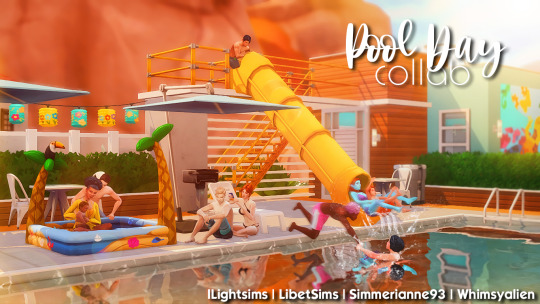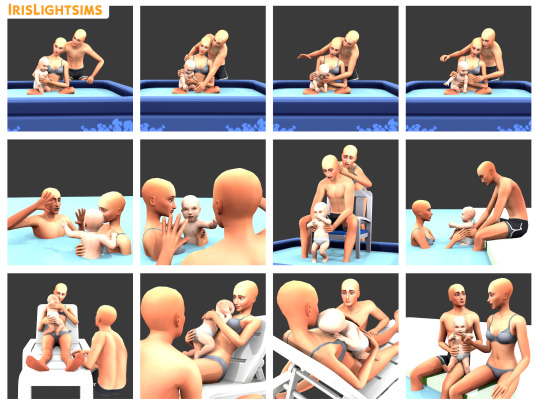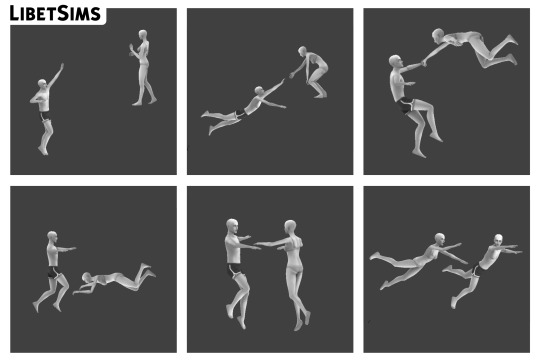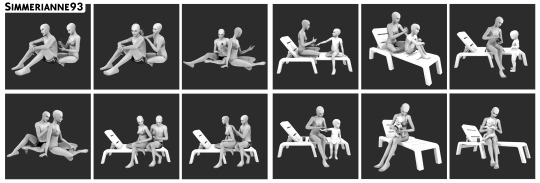#Libet
Explore tagged Tumblr posts
Text
Colaboración: Pool Day!





ESP / ENG 👇
ESP👇 ¡Holo! En esta ocasión les traigo un pack de poses en colaboración con tres grandiosas simmers: LiBetSims, Simmerianne93 y Whimsyalien.
Las poses que yo hice son a color y, las poses que cada simmer hizo para la colaboración son en blanco y negro. Y, al final de este texto, encontrarán el enlace hacia mi descarga y hacia las entradas de las simmers y sus propias descargas.
Espero que les gusten <3 Gracias por su atención
¿Qué necesitas? • Andrew’s pose player • Teleport any sim de Scumbumbo
Términos de uso: • No reclames mis animaciones o poses como tuyas. • No resubas mis animaciones o poses en ningún otro sitio. • Dame créditos si usas mis animaciones o poses. *Si encuentras algún problema con el enlace de descarga, házmelo saber.
ENG👇
Hello! This time I bring you a pack of poses in collaboration with three great simmers: LiBetSims, Simmerianne93 and Whimsyalien. The poses that I did are in color and the poses that each simmer did for the collaboration are in black and white. And, at the end of this text, you will find the link to my download and to the entries of the simmers and their own downloads.
I hope you like them <3 Thank you for your attention
What do you need? • Andrew's pose player • Teleport any sim by Scumbumbo
𝐓.𝐎.𝐔 • Don't claim my animations or poses as your own. • Don't re-upload my animations or poses on any other site. • Give me credits if you use my animations or poses. *If you find any problem with the download link, please let me know.
Descarga / Download
Simfileshare / Google Drive
Enlaces de Colaboración / Collab links LibetSims Simmerianne93 Whimsyalien
#sims 4#thesims4#the sims 4#irislightsims#poses#simmerianne93#whimsyalien#Libet#sims poses#pool day#colaboracion simmer#simmer#simblr
194 notes
·
View notes
Text
The Nature of Control — A Philosophical and Spiritual Investigation - Post 1 of 5
The concept of control is both universally recognised and deeply elusive. Photo by JESHOOTS.com on Pexels.com From the mundane attempts to manage daily tasks to the profound philosophical reflections on the nature of existence, control underpins much of human endeavour. Yet, as we grapple with its meaning, we quickly realise that control is not a single, monolithic idea but a multifaceted and…

View On WordPress
#adhiṭṭhāna#agency#Amor Fati#anicca#Aristotle#Bandura#biopower#Buddhism#collective agency#collectivism#Confucianism#consciousness#control#Dao De Jing#Daoism#Descartes#determinism#eph’ hêmin#epistemology#ethical implications#free will#hegemonikon#hekousion#individualism#Laozi#Libet#locus of control#logos#meditation#metaphysics
2 notes
·
View notes
Text

All Dolled Up 🪞
|
Jamma’s newest fic shot me dead.
#Libet’s delay by the caretaker is what this image sounds like#I listened to his whole discography while drawing this#the somber vibe fits so well#anyway back to sobbing#ouijeeart#ouijee art#cookie run#cookie run kingdom#crk#shadow milk cookie#pure vanilla cookie#pureshadow#puremilk#shadowvanilla#jambound#dollfaced#artists on tumblr
641 notes
·
View notes
Text
love a frustrated groan after a sneeze.
like damn, they're really getting annoying, huh? they just keep coming. you just can't ignore them, just can't avoid them.
you can't stop, can you?
296 notes
·
View notes
Text
The Caretaker - Libet's Delay
4 notes
·
View notes
Text
i LUVLUVLUVLUUUUVVVVV my wifey. ok. #1 e-kitten boo 👅👅 but it's so silly when someome has like a lil internet crush on me. ,. ots so cute and flattering like YOU are obsessed with ME? the person i admire and start explodint when i see them admires ME?? hwat
and they ger like excited when i int w them i literally start kicking my feet and peeing vro

#hehehahehhe#internet crush#tumblr crush#gulp#i heart my wife#i LUUUVVV my WIFE 💜💜👅👅🪱#🪱#🪱🪱🪱#🪱🪱#🪱🪱🪱🪱🪱🪱🪱🪱🪱👅#the caretaker#libets delay#libet's delay my love#nghhhhhh#ngh#ranfren#Spotify
9 notes
·
View notes
Text
the caretaker's music is very pretty and sad
2 notes
·
View notes
Text
PhD Journal - 09 11 2024
The paradox of Libet’s experiment : the proof of free will
How do we prove we have free will, as fully conscious agents? This question has puzzled philosophers, neuroscientists, and thinkers for centuries. The concept of free will—the ability to make choices independent of external determinants—sits at the heart of our understanding of human agency and responsibility. In this article, we will explore the intersection of philosophical ideas and scientific experiments, focusing on the groundbreaking work of Benjamin Libet and its implications for our understanding of free will.
We find that there is quite a lot of philosophical foundation to ground and think about the concept of free will. Philosophers like Descartes, Kant, and Sartre have grappled with the notion of free will. Descartes emphasized the importance of human consciousness and rationality, while Kant argued for the autonomy of moral agents. Sartre, on the other hand, posited that humans are condemned to be free, bearing the weight of complete responsibility for their actions. These philosophical perspectives provide a rich backdrop for our inquiry into the nature of free will. Within this thought process exists the debate of compatibilism versus incompatibilism. The debate between compatibilists and incompatibilists further complicates our understanding of free will. Compatibilists argue that free will can coexist with determinism, suggesting that our choices, while influenced by prior states and events, still allow for meaningful autonomy. Incompatibilists, however, contend that true free will is incompatible with determinism, asserting that for our choices to be genuinely free, they must not be determined by preceding events.
In the ongoing debate about free will, I align myself with the philosophy of compatibilism. This perspective recognizes that while our actions are undoubtedly influenced by a multitude of factors—such as our historical, social, economic, psychological, emotional, and academic backgrounds—we still possess the ability to make conscious decisions. Compatibilism allows for a nuanced understanding of human behavior, where individuals are seen as agents capable of acting according to their preferences, belief systems, and personal knowledge. It acknowledges that we can choose to act through or against our biases, driven by our will to navigate the complex interplay of influences that shape our lives.
In the 1980s, neuroscientist Benjamin Libet conducted experiments to investigate the timing of conscious intention and brain activity. Participants were asked to move their fingers at a time of their choosing while Libet measured the brain's readiness potential, an electrical signal indicating the brain's preparation for movement. Libet conducted experiments showing that brain activity related to movement (the readiness potential) occurs before the conscious intention to move. This suggests that the brain initiates actions before we are consciously aware of deciding to perform them. Participants in his experiments reported that they felt free to move whenever they wished and were not compelled to act. This introspective feeling of free will was a crucial part of his experimental design and interpretation. If participants had felt compelled to move, it would have undermined the validity of the experiments, as the subjective experience of free will was essential to Libet's conclusions. The experiments sought to demonstrate that the conscious decision to act follows the brain's initiation of that action, rather than being the instigator. Libet also proposed the concept of "veto power," suggesting that while the initiation of actions might be unconscious, the conscious mind has the ability to veto or inhibit these actions. This idea adds another layer to the debate about free will and conscious intention.
In Libet's studies, participants were indeed required to be willing and cooperative, meaning they needed to perform the task as instructed, which involved moving their finger at a time of their choosing. This cooperation ensured that the data collected was relevant to the question Libet was investigating: the timing of conscious intention relative to the brain's readiness potential. If participants were uncooperative or deliberately chose not to move, it would have skewed the results and made it difficult to draw meaningful conclusions about the relationship between brain activity and conscious intention. Cooperative participants who chose to move were essential for Libet to observe and measure the precise timing of brain activity and conscious intention. This helped to substantiate his theory that the brain initiates actions before we become consciously aware of deciding to perform them.
In the context of Libet's experiments, if participants didn't feel compelled to move their finger "at will" and chose not to move, it could indeed be interpreted as evidence of free will. This refusal to act would suggest that participants have the conscious ability to veto or inhibit a movement initiated by unconscious brain activity. Libet himself proposed the concept of "free won't," the idea that while the brain might initiate an action unconsciously, the conscious mind can still choose to stop it. This implies that the conscious mind has a sort of veto power over the actions initiated by the brain, allowing for a form of free will to be exercised in deciding whether or not to complete the action. The concept of "free won't," or the ability to consciously veto an action initiated by unconscious brain activity, supports the idea that we do have some level of control and agency over our actions. This nuanced understanding indicates that while our decisions may be influenced by unconscious processes, we still possess the capacity to exercise conscious choice and control.
Libet's experiments, which reveal that the brain initiates actions before conscious intention, pose an intriguing challenge to traditional notions of free will. However, from a compatibilist perspective, these findings do not negate the existence of free will. Instead, they highlight the intricate relationship between unconscious brain processes and conscious decision-making. The concept of "free won't," where individuals retain the power to veto or inhibit actions initiated by the brain, aligns well with compatibilism. This nuanced understanding supports the idea that while unconscious processes may influence our actions, we retain the capacity for conscious control and intentionality.
Libet's experiments present a unique paradox when it comes to proving the existence of free will. On the one hand, the experiments show that the brain's readiness potential—an unconscious signal—precedes the conscious intention to move. This finding challenges the traditional notion of free will, suggesting that our actions may be initiated by unconscious processes before we become aware of them. However, the concept of "free won't" adds a layer of complexity to this paradox. Libet proposed that while the brain may initiate actions unconsciously, individuals have the conscious ability to veto or inhibit these actions. This idea suggests that we do possess a form of free will, even if it's not in the way we traditionally understand it.
The paradox posed by Libet’s experiment stands as such: On the one hand, there is proof of free will through our actions. Indeed, if participants move their finger, the readiness potential precedes the conscious decision, which seems to argue against traditional free will. On the other hand, there is also proof of free will through our inaction. Because, if participants choose not to move, their conscious veto demonstrates an exercise of free will. This paradoxical nature of Libet's findings highlights the complexity of studying free will. It suggests that free will may not be about the initiation of actions but rather about the conscious ability to control and inhibit those actions. This perspective aligns with compatibilism, which posits that free will can coexist with deterministic processes.
By examining both the movement and non-movement of participants, we see that free will might exist in the nuanced interplay between unconscious brain activity and conscious control. This understanding encourages us to rethink the nature of free will, moving beyond binary notions of free vs. determined actions.
In embracing compatibilism, we acknowledge the complexity of human agency. By integrating the insights from Libet's experiments with philosophical perspectives on free will, we gain a richer understanding of the interplay between unconscious influences and conscious choices. The paradox in Libet's experiments does not provide a straightforward answer to the question of free will. Instead, it invites us to embrace the complexity of human consciousness and agency. It challenges us to consider that free will might be more about our ability to consciously influence and control our actions rather than solely about initiating them. This approach not only deepens our understanding of free will but also affirms the profound capacity for human autonomy and responsibility.
#contemporary philosophy#philosophy#philosophie#my writing#neurology#neuroscience#Libet's experiment#compatibilism#free will#phdjourney#phdjournal#phdblr
3 notes
·
View notes
Text
2 notes
·
View notes
Text
I'll let you all take your own conclusions about this video.
12 notes
·
View notes
Text
Libet's Delay


#my art#art#artist#fnf#mid fight masses#friday night funkin#artist on tumblr#nothing#nothing world#selever and rasazy#selever#rasazy#liminal#liminal spaces#the caretaker#libet's delay
2 notes
·
View notes
Audio
Listen to: Libet's delay by The Caretaker
8 notes
·
View notes
Text
you okay babe? you look like you're about to...

108 notes
·
View notes
Text
i get such a weird sort of comfort from abandoned malls. like i literally cannot describe to you how or why but it just makes me feel so at ease, and it's probably why i like mallsoft so much
#saw a video on yt that was 'the caretaker - libet's delay but it's playing in an abandoned mall' and all the comments r talking abt how like#sad it makes them feel. and like i kinda get it. the caretaker's works generally have some sort of air of sadness to them#but idk it just makes me feel so. at peace#like the thing that i've heard the most that makes ppl feel unease w the caretaker's works is incessant repitition#bc some caretaker songs r litterally just the same soundbyte looped over and over again to the point that if it was on repeat i#t'd probably be hard to determine where the song truly starts and ends#but that's something i've Also always found comfort in#idk blame the undiagnosed adhd maybe but i listen to a lot of stuff on repeat anyways so listening to the same thing over and over again#is just like. normal to me#there is comfort in knowing what comes next and what have you#archie warbles#do i have a caretake tag. i already forgot#the answer was no i didn't so#.beyondthisworld
2 notes
·
View notes
Text
En una carta a Rabindranath Tagore, Albert Einstein Dijo que si la Luna fuese dotada de autoconciencia estaría perfectamente convencida de que su camino alrededor de la Tierra es fruto de una decisión libre...
#¿Realmente existe el libre albedrio o es meramente una ilusión?#actuar#Albert Einstein#autoconciencia#Baruch Spinoza#cerebro#conciencia#Creencia#Creer#Daniel Wegner#David Hume#destino#engaño#Experimento de Libet#inconsciente#libres#Marvin Minsky#no existe#Rabindranath Tagore#Realidad#Thomas Henry Huxley#voluntad
0 notes
